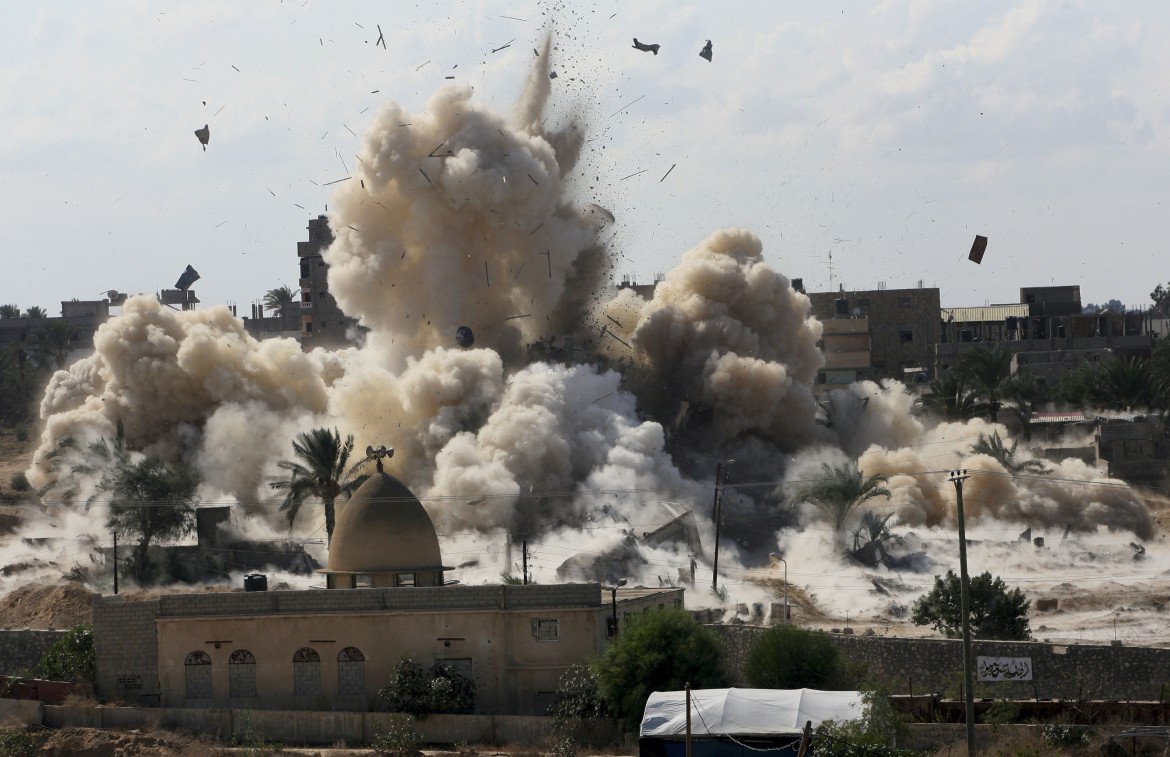Report
Human Rights Watch: El-Sisi’s regime is committing war crimes in Sinai
Egypt attempts to justify its extrajudicial killings, arbitrary searches and arrests, and air raids with the pretext of fighting radical terrorism. But a new Human Rights Watch report shows civilians in Sinai are being terrorized by el-Sisi’s regime.

Once upon a time, there was Sinai—but little remains of it today. The anti-terrorism campaign launched by the Egyptian government in February 2018, which was supposed to last for just a few months, is still ongoing, and it has brought unprecedented devastation. Communities have been razed, agricultural land has been devastated, there are curfews and almost everything is shut down.
And there are also extrajudicial killings, arbitrary searches and arrests, bombings and military operations in civilian areas. This modus operandi is not new at all: the Egyptian army has been acting in this manner ever since 2014, the year following General el-Sisi’s coup, turning his aim on radical (and also non-radical) Islamist groups as his preferred target.
He has been going after the Muslim Brotherhood with arrests, mass trials and death sentences; however, when dealing with the groups linked to al-Qaeda and ISIS—many of which are operating in the Sinai region—el-Sisi has been using military campaigns, which inevitably affect the civilian population, already structurally marginalized by the central government.
A 134-page report published Tuesday by Human Rights Watch, the result of extensive research conducted from 2016 to 2018, gives us a more accurate picture. The report is based on interviews with civilians, activists, journalists and former soldiers.
Its conclusion is as stark as can be: the Egyptian armed forces (40,000 troops deployed in the region, in cooperation with Israel, as denounced by Human Rights Watch, which is also demanding explanations from Tel Aviv, and as effectively admitted by el-Sisi) have committed, and are committing, war crimes in Sinai. These have taken many forms: mass arrests, forced disappearances, extrajudicial killings, land and air raids against civilian communities, resulting in cutting them off from access to food and essential goods, torture, the arrest of minors, and deaths during incarceration.
Cairo is trying to justify all of this with the pretext of the war against radical Islamism, which has been responsible for attacks on tourists, the Coptic community and the Muslim community over the past few years. What has actually been happening these years in the Sinai peninsula remains unknown to most outsiders, as reporters are unable to come in and there is little information provided by those who live there.
Families tell of missing relatives, raids by soldiers who ordered them to leave their homes within 24 hours, the impossibility to obtain fuel, and the destruction of the poorest communities for “security reasons.”
HRW is accusing the regime of “the targeting and abuse of civilians” and “the failure to distinguish civilians from combatants.”
“Instead of protecting Sinai residents in their fight against militants, the Egyptian security forces have shown utter contempt to residents’ lives, turning their daily life into a nonstop nightmare of abuses,” said Michael Page, deputy director of Human Rights Watch for the Middle East and North Africa.
This is what anti-terrorism means in the time of el-Sisi, something for which the coup-installed president is receiving praises and high honors in European capitals. For many months now, activists and NGOs have been denouncing what is happening to the 500,000 inhabitants living in Sinai: tens of thousands of people have been driven from their homes, and over 12,000 residents have been arrested in the period between 2014 and 2018, according to the Tahrir Institute for Middle East Policy.
The extent of the devastation can be seen in satellite images (something entirely outside the reach of the Egyptian regime), which reveal ghost towns, burned and abandoned agricultural fields and entire villages razed to the ground. They have been replaced by checkpoints and military bases, which effectively prevent domestic travel, while Rafah—one of the main cities of the Peninsula, bordering Gaza—has practically disappeared off the map, together the cities of al-Arish and Sheikh Zuwayd. Out of Rafah’s previous 80,000 residents, just a few hundred remain there today.
The families of the displaced are accusing the fact that they have received so little compensation that they are unable to rebuild their lives. Furthermore, the lush green that used to adorn the communities—olive groves, orchards, agricultural fields—has disappeared together with the residents: at least 40,000 olive trees are now in restricted areas, and agriculture has been banned, since—according to Cairo—militants might find places to hide among the plants.
Cairo seems to have an answer for everything, and its European allies are swallowing everything unquestioningly. On May 20, the International Monetary Fund released the last tranche of two billion dollars from a $12 billion loan, after verifying that Egypt has complied with the previous agreements, involving the following: the implementation of austerity measures, an increase in GDP, the removal of barriers to foreign investment and the reduction of state intervention in the economy.
In practice, these measures are not working out as planned: the army is increasingly present with its own companies in the strategic sectors of infrastructure and the production of basic necessities, and the lower classes are the only ones bearing the brunt of the cuts.
The lower social strata have been reduced to a condition of near-unprecedented misery: with 60% of Egyptians at poverty level or below, the population will now have to face even more cuts and tax increases. In July, the electricity prices will rise by 14.9%, after the government already announced in April a 45% cut in fuel subsidies and a 75% cut in electricity subsidies.
Originally published at https://ilmanifesto.it/in-sinai-i-crimini-di-guerra-di-al-sisi/ on 2019-05-29
